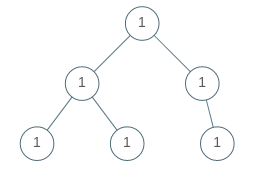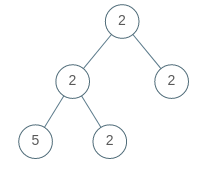[LeetCode] 965. Univalued Binary Tree 单值二叉树
作者:互联网
A binary tree is univalued if every node in the tree has the same value.
Return true if and only if the given tree is univalued.
Example 1:

Input: [1,1,1,1,1,null,1]
Output: true
Example 2:

Input: [2,2,2,5,2]
Output: false
Note:
- The number of nodes in the given tree will be in the range
[1, 100]. - Each node's value will be an integer in the range
[0, 99].
这道题定义了一种单值二叉树,需要二叉树中所有的结点值相同。先给了一棵二叉树,问是不是单值二叉树。其实就是考察遍历二叉树,当然递归的方法在写法上最简单了。这里可以将每个结点值都跟根结点值进行比较,只要任意一个不相同,则表示不是单值二叉树。所以需要将根结点值当个参数代入递归函数,所以写一个 helper 函数,进行先序遍历的递归写法即可,参见代码如下:
解法一:
class Solution {
public:
bool isUnivalTree(TreeNode* root) {
return helper(root, root->val);
}
bool helper(TreeNode* node, int val) {
if (!node) return true;
if (node->val != val) return false;
return helper(node->left, val) && helper(node->right, val);
}
};
当然我们也可以不写额外的子函数,在一个函数比较,只要任意一个结点的左右子结点值(存的的话)均和其父结点值相等,则一定是单值二叉树。所以在一个函数中也可以进行比较,参见代码如下:
解法二:
class Solution {
public:
bool isUnivalTree(TreeNode* root) {
if (!root) return true;
if (root->left && root->left->val != root->val) return false;
if (root->right && root->right->val != root->val) return false;
return isUnivalTree(root->left) && isUnivalTree(root->right);
}
};
上面的解法都是递归写法,来看迭代写法的层序遍历吧,解题思路并没有什么不同,就只是遍历的方法不同而已,参见代码如下:
解法三:
class Solution {
public:
bool isUnivalTree(TreeNode* root) {
if (!root) return true;
queue<TreeNode*> q{{root}};
while (!q.empty()) {
TreeNode* t = q.front(); q.pop();
if (t->val != root->val) return false;
if (t->left) q.push(t->left);
if (t->right) q.push(t->right);
}
return true;
}
};
Github 同步地址:
https://github.com/grandyang/leetcode/issues/965
类似题目:
Find All The Lonely Nodes
参考资料:
https://leetcode.com/problems/univalued-binary-tree/
LeetCode All in One 题目讲解汇总(持续更新中...)
标签:node,965,return,val,tree,Tree,二叉树,root 来源: https://www.cnblogs.com/grandyang/p/14113761.html